The Human Papillomavirus (HPV) causes 5 percent of cancers worldwide in men and women. Although a vaccine to prevent HPV infections was released in 2006 as a cancer prevention tool, vaccination completion rates are far below the national target of 80% (currently 42% for girls and 28% for boys). In Massachusetts, rates in 2014 were higher that national averages at 69% for girls and 54% for boys, though still falling well below the target 80%.1
The vaccination initiative
To strengthen HPV immunization infrastructure and performance, the CDC awarded public health funding to 11 states in 2013, including Massachusetts. Funding to the MA Department of Public Health established the MA HPV Vaccination Initiative, a one-year grant funded project based on the President's Panel Report2 and the subsequent national call to action to increase HPV vaccination to prevent cancer. Already a national leader in HPV vaccine uptake and HPV-related cancer prevention, Massachusetts's Department of Public Health (MA DPH) used the CDC funding to undertake 4 specific tasks, the first of which was to bring together partners and stakeholders from across the Commonwealth. This Vaccination Initiative Group consisted of more than 100 members, from 29 partner organizations including American Cancer Society, Dana-Farber Cancer Center, MA Chapter of American Academy of Pediatrics, and cervical cancer advocacy non-profit, Team Maureen. (See complete list in Table 1) Membership spanned the healthcare system including academic medical institutions, private practice, non-profits, and state and local health departments. The Vaccination Initiative Group met regularly to bring their particular experiences and expertise to the planning and execution of the other identified tasks.
Table 1.
Vaccination initiatives members under CDC funded grant.
| 15–40 Connection | Massachusetts Department of Public Health |
|---|---|
| American Cancer Society, New England Division | Bureau of Infectious Disease |
| Blue Cross Blue Shield of Massachusetts | Communications Office |
| Boston Children's Hospital | Comprehensive Cancer Prevention and Control Program |
| Boston Medical Center | Division of Sexually Transmitted Disease Prevention |
| Boston Public Health Commission | Family Planning Program |
| Boston University, School of Medicine | Immunization Program |
| Crown Obstetrics and Gynecology | Office of Adolescent Health |
| Dana Farber Cancer Institute | Office of Clinical Preventive Services |
| GlaxoSmithKline | Office of Health Equity |
| Harvard Pilgrim Health Care Institute, Department of Population Medicine | Office of Oral Health |
| Harvard Vanguard Medical Associates / Atrius Health | School-Based Health Center Program |
| Health Alliance Fitchburg Family Medicine | School Health Services |
| Healthy Mothers, Healthy Babies Coalition of Massachusetts | Massachusetts League of Community Health Centers |
| John Snow, Inc. | Massachusetts Medical Society |
| Joint Commission for Children's Health Care in Everett | Massachusetts Parent Teacher Association |
| Massachusetts Academy of Family Physicians | Merck Pharmaceuticals |
| Massachusetts Chapter of the American Academy of Pediatrics | Salem State University, Office of Counseling and Health Services |
| Massachusetts Chapter of American Congress of Obstetricians and Gynecologists | Team Maureen |
| Massachusetts Department of Elementary and Secondary Education | The Yellow Umbrella |
| VNA Care Network and Hospice | Veterans Administration |
One such task during the Vaccination Initiative grant period was a media campaign conducted during “back to school” season. The primary audience was parents of adolescents with a focus on Hispanic and African American groups. Its goal was to increase understanding of the importance of HPV vaccine to prevent cancer. CDC materials were used, including 30-second TV and radio advertisement. The campaign had a net audience reach of over 2.4 million people. Daily tweeting complemented the campaign, reaching over 18,000 followers.
Another effort led by MA DPH during the Vaccination Initiative grant period was supporting providers in the implementation of the new MIIS immunization coverage reports so as to better track rates and improve reminder/recall functions for offices. Reminder functions combined with accurate immunization rates for offices were deemed valuable in increasing overall vaccinate rates. Also, MA DPH provided a webinar and workshop “Using the MIIS to Improve HPV Rates in Your Practice.”
Educational activities undertaken by the MA DPH Vaccination Initiative during the CDC-funded grant period used evidence-based strategies as a framework for increasing knowledge around HPV and cancer and improving immunization practices to increase HPV vaccination rates. There were over 50 such educational events, reaching over 2,700 people. Examples of these efforts included webinars for providers, grand rounds, conferences and seminars (targeting residents and medical students) as well as parent groups.
Massachusetts conducted 5 HPV vaccination webinars (strengthened by CE credits) between January 2014 and January 2015, with topics focused on key strategies to increase immunization rates. Topics presented included:
-
•
“You are the Key to HPV Cancer Prevention”
-
•
“Evidenced-Based Strategies for Improving Vaccination Rates”
-
•
“Eliminating HPV Vaccination Missed Opportunities”
-
•
“One Process Improvement at a Time”
-
•
“Using the MIIS to Improve Vaccination Rates.”
Another educational effort was the second annual HPV/Cervical Cancer Summit in November 2014 (Fig. 1). It was offered by the MA DPH's Immunization Program, in conjunction with the Dana Farber Cancer Institute and Team Maureen. The annual event, launched by Team Maureen and Dana-Farber Cancer Institute in 2013, brings over 100 health professionals together each year. The Summit offers the opportunity for providers, researchers, educators, public health workers, and advocates to come together to discuss the most current research and efforts around decreasing HPV-related cancers.
Figure 1.
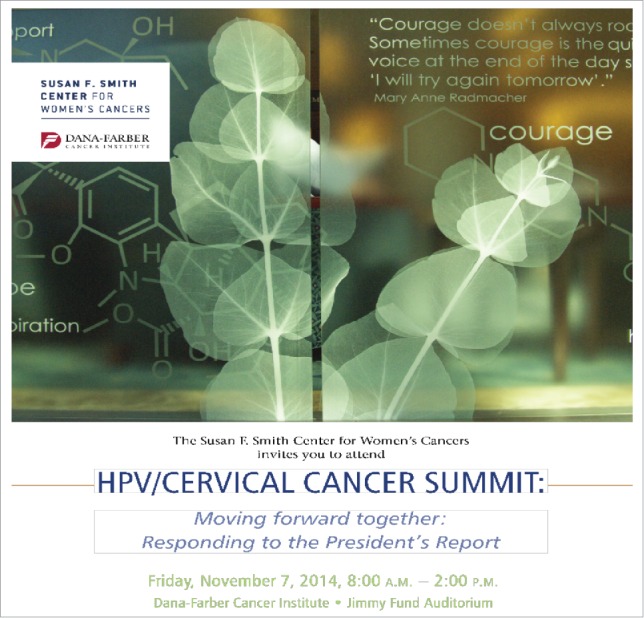
HPV/Cervical Cancer Summit. © DFCI Communications/Community Benefits. Reproduced by permission of DFCI Communications/Community Benefits. Permission to reuse must be obtained from the rightsholder.
Massachusetts DPH also developed a flyer encouraging providers to “Take the HPV Vaccine Challenge,” which was distributed widely during the length of the grant period and then also featured in national CDC campaigns.
The development of the ‘coalition’
Upon conclusion of the grant-funded period led by MA DPH, Team Maureen communicated their interest in helping continue the efforts of the Initiative, so as to maintain momentum. They volunteered to continue the coordination of the stakeholders as part of a new component of their cervical cancer prevention efforts. And with that, the MA Coalition for HPV-Related Cancer Awareness was formed (Fig. 2). With dozens of active members committed to HPV vaccination and cancer prevention, the Coalition was immediately a robust and diverse collective. Composed of many of the same stakeholders (membership listed in Table 2) and initially focused on many of the same goals, the Coalition allowed for members to continue their partnerships and collaboration as they worked on HPV-related cancer prevention. Membership in the Coalition is free and is maintained by lead organization, Team Maureen. Team Maureen currently hosts a Coalition website, interactive calendar, encourages new members, organizes biannual Coalition meetings and coordinates Coalition-related efforts through a newly formed branch of their organization. They also serve as co-chair of the MA DPH's new Cervical Cancer Workgroup, and as such, interact and collaborate with MA DPH.
Figure 2.
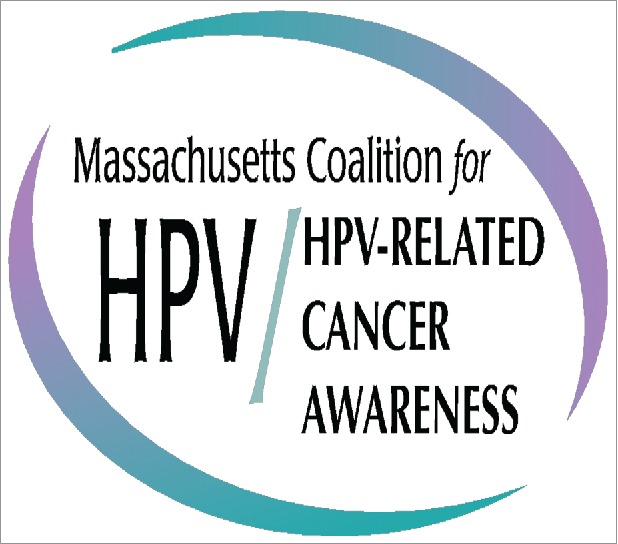
Coalition logo. © Team Maureen. Reproduced by permission of Team Maureen. Permission to reuse must be obtained from the rightsholder.
Table 2.
Coalition for HPV-Related Cancer Awareness members.
| Team Maureen | Crown OB/GYN |
|---|---|
| American Academy of Pediatrics; MA Chapter | Falmouth Pediatrics |
| The Yellow Umbrella | Brigham and Women's Hospital |
| Boston Public Health Commission | Smiles by Rosie |
| Dana Farber Cancer Institute | MA Commission of the Status of Women |
| Sociedad Latina | UMass Memorial Children's Medical Center |
| MA Dept. of Public Health | Pediatrics West |
| American Cancer Society—NE | Salem State University |
| 15/40 | Boston Medical Center |
| BC/BS MA | Pioneer Valley Urology |
| Cape Cod Healthcare | Barnstable County Depart. of Health/ Environ. |
| Codman Square Health | VNA Care Network |
| MA Caucus of Women Legislators | MA League of Community Health Centers |
The Massachusetts Coalition for HPV-Related Cancer Awareness' activities center around education, vaccination, and infrastructure. The Coalition has work groups and subgroups to implement specialized projects, some of which are continuations from the original CDC funded grant.
Activity 1: HPV/cervical cancer summit
Coalition partners: Summit Organizers–Team Maureen, Dana Farber Cancer Institute and Community Benefits, MA DPH; Presenting Organizations–Dr. Perkins of Boston University, Dr. Lett and Rebecca Vanucci of MA DPH, Dr. Feldman of Brigham and Women's Hospital, Drs. Matulonis, Vismanath, and Haddad of Dana Farber Cancer Institute/Brigham and Women's Cancer Center, Cynthia McReynolds of the MA Chapter of American Academy of Pediatrics.
The Summit continues to offer stakeholders and those interested in HPV and cervical cancer the opportunity to stay abreast of current developments. It has become a model for other communities looking to build HPV-related cancer efforts. This November 2017 will mark the fifth annual summit.
Activity 2: Dental toolkit and presentations
Coalition partners: Dental Toolkit–Team Maureen, MA Chapter of AAP, Cape Cod Healthcare, Dr. Melissa Gilkey of Harvard Medical School & Harvard Pilgrim Health Care Institute, National Network of Libraries of Medicine/NIH, Lisa Leydon of American Cancer Society; Dental Presentations: Dr. Alessandro Villa of Brigham and Women's Hospital, Dr. Rosie Wagner of Smiles by Rosie, Eileen Lind of Team Maureen, Rebecca Vanucci of MA DPH, Dr. Rebecca Perkins of Boston University Medical, and Jill Seaman.
The Coalition continues efforts to educate providers about the HPV–Cancer Connection. The initial education efforts from the CDC grant period focused on pediatricians and primary practice. These efforts have continued, and also expanded, under the Coalition to also include the dental community in HPV patient education. Provider-focused educational presentations expanded to include oral HPV presentations for dental professionals, using the educational curriculum designed by Team Maureen and essential input from dentists in the Coalition. Presentations were offered in partnership with Massachusetts Dental Society, Massachusetts Dental Hygienists Association and local dental providers in Cape Cod and the Boston area.
Team Maureen and the Coalition also worked to develop and distribute a new educational tool called the Oral HPV Toolkit (some components featured in Fig. 3; available online at http://teammaureen.org/about/materials/c/680)
Figure 3.
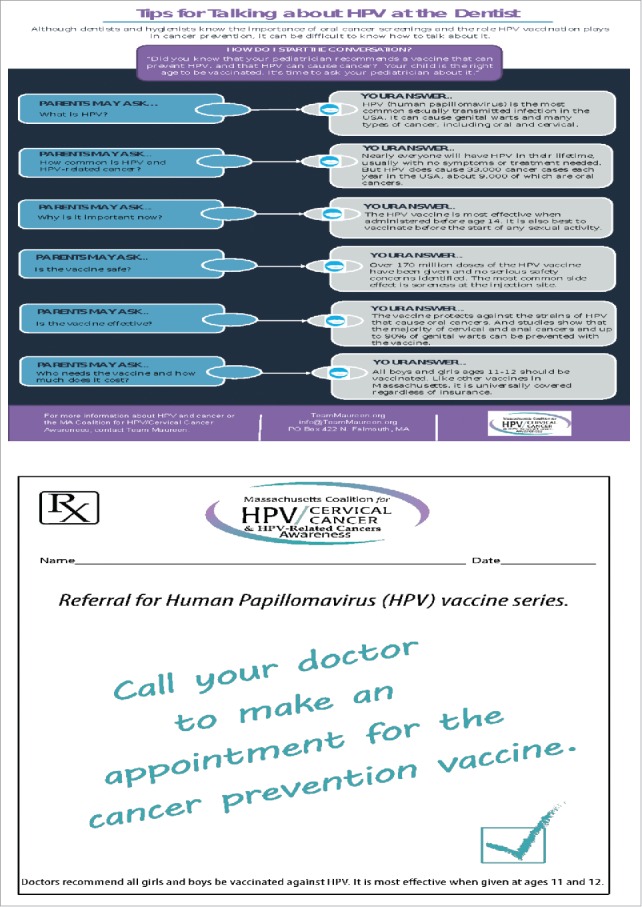
Dental toolkit components. © Team Maureen. Reproduced by permission of Team Maureen. Permission to reuse must be obtained from the rightsholder.
These toolkits contain:
-
•
Talking Tips: An informational sheet with advice for dentists/hygienists about starting the conversation with patients about HPV, and answers to common questions
-
•
Understanding HPV and Cancer at the Dentist: Brochures for patients on HPV and Cancer
-
•
Cancer Prevention Office Poster: A brief poster to display in the office. It also has an insert of the brochure that patients can look for to get more information.
-
•
Referral Tear Off Note Pads: These note pad sheets can be distributed after a conversation about the HPV vaccine to remind parents to contact their pediatrician following their dental appointment.
The Toolkit materials were available at Coalition's exhibit table at the Yankee Dental Congress in 2016, where more than 200 were distributed. The Coalition panel presentation was accepted at the Yankee 2017 Conference and received overwhelmingly positive feedback, such that the presentation was invited back to Yankee 2018. Another 250 dental Toolkits were distributed in 2017, as well as making the Toolkit available for online download through the TeamMaureen.org website. All recipients of the Toolkit receive a follow up email survey on the usefulness of each Toolkit component and an assessment of their change in practice surrounding talking about HPV with patients. This data analysis is underway and will be presented at National Oral Health Conference (NOHC) and Association of State Territorial Dental Directors, (ASTDD) in 2017.
Activity 3: Educational curriculum for adolescents and parents
Coalition partners: Team Maureen, Magnolia Contreras and Sarah Gunn of Dana Farber Community Benefits, Sociedad Latina, Dr. Melissa Gilkey of Harvard Medical School & Harvard Pilgrim Health Care Institute
An additional project of the Coalition involved development and validation of HPV and Cancer curriculum for vaccine eligible youth and parents about the HPV-Cancer connection and vaccination. The curriculum began with Team Maureen's HPV educational presentations, which combined basic sexual education with HPV-cancer prevention. This was adapted for use with young people during a summer program at Latina Sociedad, a community organization in Boston. With grant support from Dana Farber Cancer Institute, the curriculum was validated with pre and post measures to ensure effectiveness. Since then, the curriculum has been offered to over 2,000 young people and adults, and in Spanish when appropriate and has demonstrated success (Fig. 4).
Figure 4.
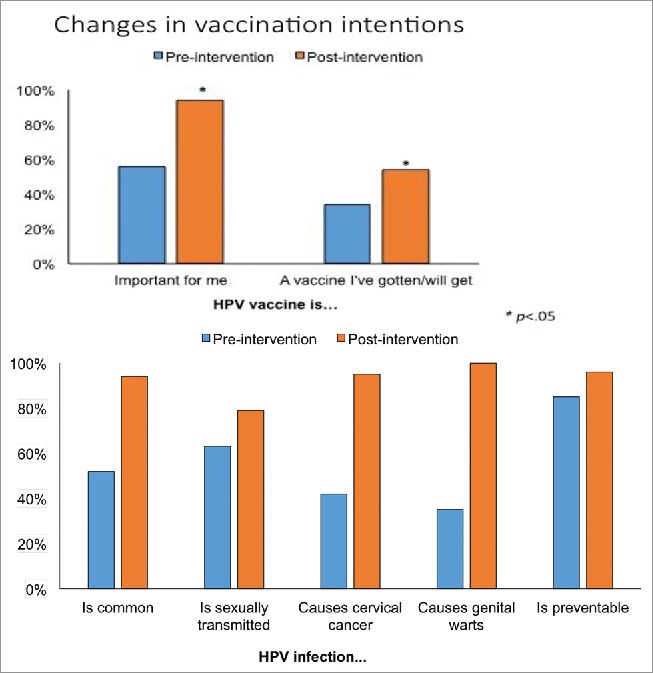
Improvement in knowledge following educational curriculum for adolescents and parents. © Team Maureen. Reproduced by permission of Team Maureen. Permission to reuse must be obtained from the rightsholder.
Activity 4: Mobile clinic
Coalition partners: Team Maureen, Boston Public Health Commission, and Dana Farber Community Benefits
The Coalition also worked to offer a Free Mobile HPV-Vaccine Clinic for Boston Public Health Commission students in 2015. The pilot program was to increase HPV vaccination rates in the medically underserved populations of Boston by eliminating structural, financial, and educational barriers to the HPV vaccine. In partnership with the city of Boston, the outreach program consisted of 7 educational workshops for parents and students in 2 Boston Public Schools, and launched 2 mobile vaccine clinics at both schools. The community outreach team from an NCI designated cancer hospital in Boston provided the evidence-based workshops, the mobile clinic, and clinical staff. To date, more than 300 high school students and 50 parents received education about HPV, HPV-related cancers, and the vaccine. Thirty-five students were vaccinated, 5 students completed vaccine series and 52 doses of HPV vaccine was administered at the mobile clinic. Sixteen students started the immunization series and 18 students received follow-up doses (started at SBHC or elsewhere). This program has continued in another BPHC school in the Fall of 2016 and is currently in process. Abstracts were presented at the American Public Health Association (APHA) and at Increasing HPV Vaccination in the US: A Collaboration of NCI-funded Cancer Centers Conference, and HPV/Cervical Cancer and HPV-Related Cancers Summit.
Activity 5: Setting statewide goals for cervical cancer screening practices
Coalition Partners: Boston University, Brigham and Women's Hospital/DFCI, UMass Worcester, Massachusetts Comprehensive Cancer Prevention and Control Program at Massachusetts Department of Public Health
Partners worked together to create the cervical cancer prevention goals for the short and long-term State Cancer Control plan, which was submitted as part of the reapplication for CDC Comprehensive Cancer funding in January 2017.
Activity 6: Educational outreach for patients in provider offices
Coalition Partners: Team Maureen, Cape Cod Healthcare, Dr. Sarah Feldman and Nancy Peña of Brigham and Women's Hospital, American Cancer Society
The first outreach in provider offices was based in Falmouth, MA, where Team Maureen and Cape Cod Healthcare partnered to develop and utilize brochures and interactive educational tablets in pediatricians' waiting rooms. The goal was to determine whether offering educational materials to patients while they are in the pediatric office, but before seeing their doctor, could impact overall HPV vaccination rates. Measured with anonymous pre/post testing, the intervention found increases in knowledge and changes in intention when parents participated in the education process (Fig. 5). This project is currently proposed for use in a gynecological clinic at Brigham and Women's hospital and is being adapted to include Spanish language materials.
Figure 5.
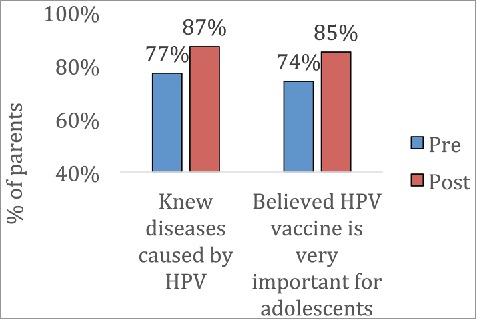
Improvement in knowledge following educational outreach to parents in provider offices. © Team Maureen. Reproduced by permission of Team Maureen. Permission to reuse must be obtained from the rightsholder.
Activity 7: Use of media as an educational tool
One of the original efforts of the Vaccination Initiative that continued through the Coalition was focused on public awareness. A variety of media tools have been used to increase public awareness. In 2016–17, a billboard education campaign occurred, and educational HPV tweeting continued through the MA DPH and Coalition partners (Fig. 6).
Figure 6.
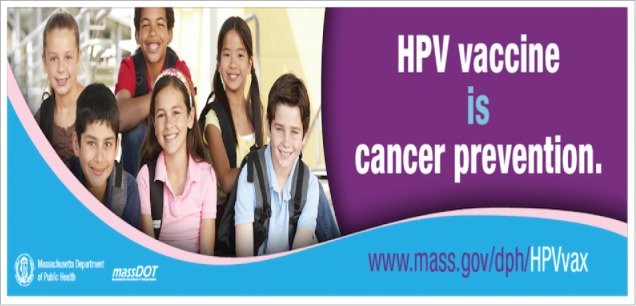
Media as an educational tool. © Massachusetts Department of Public Health and Massachusetts Department of Transportation. Reproduced by permission of Massachusetts Department of Public Health and Massachusetts Department of Transportation. Permission to reuse must be obtained from the rightsholder.
Screening the full-length movie, Someone You Love: the HPV Epidemic, was used to educate both the public and providers, as CE credits were available. Both the Boston Public Health Commission and Team Maureen have created PSAs as awareness tools. The Boston Public Health Commission engaged students in the design and creation of their PSA. Team Maureen partnered with the Cancer Committee of Cape Cod Healthcare to create a PSA on HPV vaccination highlighting the stories of local people touched by HPV-related cancer. Both PSAs are available for viewing at www.TeamMaureen.org
Throughout the last 2 years, many other community awareness events were held at athletic events and health fairs throughout Massachusetts by various Coalition members. Events include attendance at the Pediatric and Adult Statewide Immunization Conferences, MA PTA Health Fair, Cape League Baseball games, among many others.
Successes, challenges and future plans
The interest, commitment, and dedication from all types of people and organizations across Massachusetts have resulted in a strong and continuing coalition of stakeholders. There is strong evidence of the potential for continued growth of the Coalition membership and the expansion of Coalition projects. All members recognize the benefit of amplifying our effect by coordinating efforts.
In addressing the HPV burden throughout Massachusetts, the greatest success over the past years is the accomplishment of bringing (and keeping) together so many varied partners to collaborate on projects. With a variety of expertise and different approaches to the HPV problem, we have been able to create diverse solutions to a diverse issue. Without the input of epidemiologists, researchers, hospitals, private practice, dentists, specialists of all types, educators and advocates, our efforts would not be as strong or successful.
Beyond our partnerships, the one particular project experiencing the greatest success is our effort to educate providers of all types about the HPV disease burden. Utilizing Team Maureen's HPV educational curriculum as a base, validating the curriculum with the assistance of Dana Farber Cancer Institute, and then combining the expertise of Dr. Rebecca Perkins in cervical cancer and Drs. Rosie Wagner and Alessandro Villa in orophyrangeal cancer, tailored presentations have been made across Massachusetts. Provider educational presentations have been attended by over 1,000 people and outreach at conferences and education tables have distributed over 500 toolkits. The oral HPV project has been tremendously well received and the demand for presentations and materials has grown almost beyond the capacity of current staff. The dental toolkit has been downloaded dozens of times from across the United States in just the first 3 months of availability.
Despite concerted effort, projects aiming to offer educational programming to students on HPV and cancer have lagged behind. The curriculum design and validation for educating high school students has been successful and impactful when presented. Effectiveness of the program has been demonstrated by pre and post surveys of participating students. Students who participate in the program in a high school setting demonstrate increased knowledge and intention to follow through with the vaccine. However gaining entrance to school districts or individual schools to provide the curriculum to students is challenging. In addition, reaching middle school audiences is even more difficult, and yet is even more important, as they are the age group that should be getting vaccinated.
A program to bring vaccination vans to schools, combined with educational programming was also less successful then hoped. Issues around implementation of this type of program that created challenges were record keeping, parent permission, student participation, and difficulty with integrating multiple systems. It was difficult to assess vaccination status between the pediatrician's office and the school-based clinics; and the MIIS (state vaccine registry) was underutilized. For this program to become more successful, there is a need for additional time and/or staff for acquiring vaccine records, to embed parent outreach activities in regularly scheduled parent events, and to increase parent and student knowledge of the initiative. This would not be as significant a barrier in communities with integrated vaccination record systems. Most importantly, clear and consistent communication across all involved systems is needed to make this type of outreach successful.
A priority to ensure the Coalition's continued success in future years is a consistent funding source for support staff. Team Maureen has supported the Coalition for 2 years and with only modest staffing time, cannot sustain or grow the Coalition as needed to maintain or increase its impact across the state. Even small grant funding for a coordinator to schedule meetings, facilitate communication among Coalition members, and manage logistics would mean greater success for all Coalition efforts. A firm organizational structure with identified work groups in the main program areas of Oral HPV, Cervical Cancer screening, HPV Vaccination, and other HPV-related cancers would also enable the Coalition to broaden membership while focusing on specific goals. Making an impact on HPV-related cancer burden required diverse approaches. With firm workgroups all under the Coalition umbrella, more people could be involved and more change could be effected.
In addition to expanding membership and creating a firm and more effective organizational structure, the Coalition also hopes to implement a ‘train the trainer’ program model for expanded reach. In both the oral HPV and general HPV presentations, there is great capacity for expansion if there are an adequate number of people to teach the classes/presentations—both in high school classrooms for dental providers, or general practitioners. A train the trainer model would allow the Coalition to build a base of educators and advocates to reach more people. As the programming expands, we also recognize the additional need for greater evaluation of programming, research on our successes including peer reviewed articles, and the development of culturally proficient programs and materials in multiple languages.
Abbreviation
- HPV
Human Papillomavirus
Disclosure of potential conflicts of interest
No authors have a conflict of interest to declare.
Acknowledgments
Additional thanks to the following, whose assistance has impacted our success:
Laureen Brady; Michael Fishbein and Cape Cod Healthcare Cancer Committee, Lisa Guyon
Allison Hackbarth; Lisa Johnson; Falmouth Pediatrics; The Jimmy Fund Clinic
The Lyndon Paul Lorusso Charitable Trust; Dr. Alexi Wright, Susan DeCristofaro, Jill Brace-O'Neill, Kathleen Houlahan, Suzette Naylor of Berkshire Area Health Education Center, Sarah Bottomley, Teagan Drawbridge, Brain Switzer, Kimberly Daly, Beth Murphy
Funding
This work was supported by Centers for Disease Control and Prevention and coalition members. No commercial support was obtained.
References
- [1].Reagan-Steiner S, Yankey D, Jeyarajah J, Elam-Evans LD, Singleton JA, Curtis CR, MacNeil J, Markowitz LE, Stokley S. National, Regional, State, and Selected Local Area Vaccination Coverage Among Adolescents Aged 13–17 Years - United States, 2014. MMWR Morb Mortal Wkly Rep 2015; 64(29):784-92; PMID:26225476; https://doi.org/ 10.15585/mmwr.mm6429a3 [DOI] [PMC free article] [PubMed] [Google Scholar]
- [2].PresidentsCancerPanel President's Cancer Panel Annual Report 2012–2013: Accelerating HPV vaccine uptake: urgency for action to prevent cancer [Internet]. 2014;Available from: http://deainfo.nci.nih.gov/ADVISORY/pcp/annualReports/HPV/index.htm#sthash.VFWWaxYh.dpbs [Google Scholar]


